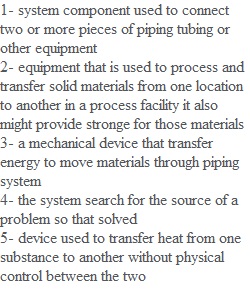


Q Introduction to Process Equipment Ch. 1 Test Word match A. Fitting B. Solids handling equipment C. Pump D. Troubleshooting E. Heat exchanger F. Hose G. Process H. Vessel I. Lubrication J. Process Technician K. Motor L. Pipe M. Process Drawing N. Tubing O. Process Industries P. Reactor Q. Tank R. Unit S. Valve T. Furnace U. Boiler V. Compressor W. Cooling tower X. Filter Y. Dryer Z. Engine 1.__equipment that is used to process and transfer solid materials from one location to another in a process facility; it also might provide storage for those materials. 2.___illustration that provides a visual description and explanation of the processes' equipment, flows, and other important items in a facility. 3.___hose or pipe of small diameter (typically less than 1 inch [2.5 cm]) used to transport fluids. 4.__an enclosed process container such as a tank, drum, tower filter, or reactor. 5.___a machine that converts chemical (fuel) energy into mechanical force. 7.__a device used to remove moisture from a process stream. 8.___device in which water is boiled and converted into steam under controlled conditions. 9.___device that removes particles from a process, allowing the clean product to pass through. 10.__a machine that is used to produce power and rotate shaft-driven equipment such as pumps, compressors, and generators. 11.__ structure designed to lower the temperature of water using latent heat of evaporation. 12.__-system component used to connect two or more pieces of piping, tubing, or other equipment. 13.___a mechanical device used to increase the pressure of a gas or vapor. 14.__piece of equipment that burns fuel in order to generate heat that can be transferred to process fluids flowing through tubes; also referred to as a process heater. 15.___piping system component used to control, throttle, or stop the flow of fluids through a pipe. 16.___device used to transfer heat from one substance to another without physical contact between the two. 17.___worker in a process facility who monitors and controls mechanical, physical, and/or chemical changes throughout a process in order to create a product from raw materials. 18.___an integrated group of process equipment used to produce a specific product it might be referred to by the processes it performs or be named after its end products. 19.___flexible tube that carries fluids can be made of plastic, rubber, fiber, metal, or combination of materials. 20.___a vessel in which a feedstock or product (intermediate or finished) is stored: might be classified as atmospheric or pressurized, aboveground or underground, fixed or floating roof. 21.___the application of a substance between moving surfaces in order to reduce friction and minimize heating. 22.___mechanical driver that converts electrical energy into useful mechanical work and provides power for rotating equipment. 23.___long, hollow cylinder through which fluids are transmitted: primarily made of metal, but also can be made of glass, plastic, or plastic-lined material. 24.___the conversion of raw materials into a finished or intermediate product. 25.___a broad term for industries that convert raw materials, using a series of actions or operations, into products for consumers. 26.___-a mechanical device that transfers energy to move materials through piping systems. 27___-a vessel in which a controlled chemical reaction is initiated and takes place either continuously or as a batch operation. 28.___-the systematic search for the source of a problem so that it can be solved. Check Your Knowledge 29. (True or False) A process technician controls mechanical, physical, and/or chemical changes throughout many processes to produce a final product made from raw materials. 30. (True or False) Process technicians analyze data and communicate data to the appropriate employees. 31. All of the following are types of process heat exchangers except: a. shell and tube b. Double pipe c. Hot wall d. Air-cooled 32. Process drawings include (select all that apply): a. Plot plans b. Blockflow diagrams c. Process flow diagrams d. System diagrams 33. In an operations role, a process technician might be required to perform the following maintenance activities(select all that apply): a. Lubricate equipment b. Replace a unit compressor c. Monitor and analyse equipment performance d. Change and clean filters 34. List five items of personal protective equipment that a process technician wears. 35. List four factors that process technicians must be aware of that can have an impact on worker safety or the environment. 36. A mechanical piece of equipment used to move liquid material through a piping system within various processes is a: a. Heat exchanger b. Compressor c. Burner d. Pump 37. Drivers that convert electrical energy into useful mechanical work and provide power for rotating equipment such as pumps, compressors, and conveyor drives are: a. Reactors b. Solids handling equipment c. Motors d. Furnaces 38. Equipment used to move non-fluid material within a process facility includes: a. Environmental control equipment b. Solids handling equipment c. Separation equipment d. Auxiliary equipment 39. How are raw materials sorted? a. By plant unit b. By their end products c. By process requirements d. By physical requirements PreviousNext
View Related Questions